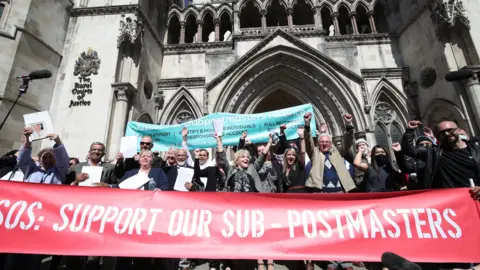The Post Office Horizon IT scandal, a monumental failure and miscarriage of justice, has resulted in over £1 billion being paid in compensation to affected sub-postmasters, as per recent government statistics. This staggering amount, which has reached a total of £1.039 billion, has been distributed among more than 7,300 individuals through various compensation schemes established in response to this scandal. The complex nature of these schemes, along with an ongoing commitment from the government to resolve outstanding claims, marks a significant chapter in the ongoing efforts to right the wrongs done to former Post Office workers.
Post Office Minister Gareth Thomas expressed the government’s determination to expedite compensation for sub-postmasters, stating, “We are settling cases every day and getting compensation out more quickly for the most complex cases, but the job isn’t done until every postmaster has received fair and just redress.” Currently, more than 4,000 individuals have been identified as eligible for compensation, but many continue to face challenges due to the lengthy and intricate process involved in accessing these funds.
The compensation landscape comprises several distinct schemes, each aimed at different groups of victims. As there is no single scheme for all sub-postmasters, eligibility relies on specific circumstances surrounding each individual claim. Among these, the Group Litigation Order (GLO) scheme stands out, particularly for its connection to Alan Bates, who spearheaded a landmark case against the Post Office. This group, which consists of 555 claimants, secured a £42.5 million settlement in 2019. However, due to the high legal costs associated with the case, the amount received by each claimant was minimal.
Under the GLO scheme, individuals can expect initial compensation of at least £75,000, although it’s anticipated that approximately two-thirds of the claimants may reject this offer in pursuit of higher payments. The government aims to process claims swiftly, with a target of providing offers to 90% of the claimants within 40 days. The total compensation disbursed under this directive thus far has reached £128 million, with the prospect of many more settlements in the pipeline.
In total, there are about 983 convictions tied to the Horizon IT program, with a significant portion instigated by the Post Office itself. Those who had their convictions quashed can opt for the Overturned Convictions Scheme—a compensation initiative that the government now oversees. Up to now, 111 individuals have had their convictions overturned, with provisions in place for even more once the new legislation that allows for retroactive annulments is implemented.
Notably, for cases involving individuals who have had their convictions overturned owing to the new law, they are eligible for initial payments of £200,000, followed by the choice of either accepting a £600,000 settlement or further negotiations for increased compensation. The scheme has already distributed considerable interim payments, with about £65 million disbursed so far.
Apart from the convicts, the scandal has also impacted many sub-postmasters who did not experience criminal charges but faced severe financial losses due to faulty calculations by the Horizon system. In September, a new independent appeals mechanism called the Horizon Shortfall Scheme was introduced to help these individuals seek redress. This scheme enables sub-postmasters to appeal if they believe their settlements do not accurately reflect their losses and hardships endured over the years.
Overall, the number of individuals potentially eligible for compensation continues to grow, creating an ongoing challenge for the already strained compensation processes. With many former postmasters seeking justice, the reparations and schemes launched by the government will play a crucial role in addressing the injustices of the past. Furthermore, families of those who passed away without receiving compensation can now apply on their behalf, showcasing an effort to ensure that no affected individual is left behind.
As investigations continue and more claimants come forward, the total amount paid out may reach even higher figures, highlighting the significant financial and emotional toll extracted from a system that failed to protect those who diligently served their communities through the Post Office. The ongoing inquiry serves as a reminder of the necessity for accountability and the restoration of trust in the institutions meant to serve society.



